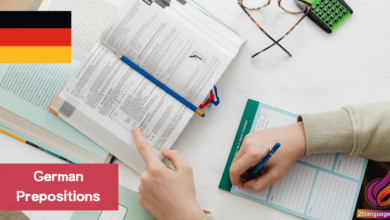Difference Between wissen and kennen

Imagine you’re exploring a vibrant German city. You might know its culture (kennen), but how deeply you understand its history (wissen) can change your experience entirely. In the German language, “wissen” and “kennen” both translate to “to know,” but they convey different nuances that are essential for effective dialog. Mastering these distinctions will enrich your conversations and deepen your connection with the language and culture. Let’s dive into this interesting aspect of German!
Understanding the Nuances of Wissen and Kennen in German Language
In the German language, two verbs that frequently enough cause confusion among English-speaking learners are wissen and kennen. Both verbs translate to “to know” in English, but thier use depends on the context.wissen is used when referring to knowledge of facts, details, or skills. It answers the question “What do you know?” In contrast, kennen is used when talking about familiarity with people, places, or things. it answers the question “Who or what do you know?” For example:
- Ich weiß,dass Berlin die Hauptstadt von Deutschland ist. (I know that Berlin is the capital of Germany.)
- Ich kenne Berlin. (I know Berlin.)
Understanding when to use each verb is crucial for clear communication. wissen is a stative verb, meaning it describes a state of being or knowledge that is not subject to change. Its conjugation differs slightly depending on the subject. For instance:
- Ich weiß (I know)
- Du weißt (You know)
- Er/Sie/Es weiß (He/She/It knows)
On the other hand, kennen is also conjugated based on the subject but focuses on personal relationships or recognitions:
- Ich kenne (I know)
- Du kennst (You know)
- Er/Sie/Es kennt (He/She/It knows)
| German Example | Verb Type | English Translation |
|---|---|---|
| Ich weiß, dass das Wetter heute schön ist. | wissen | I know that the weather is nice today. |
| Ich kenne die Stadt Hamburg. | kennen | I know the city of Hamburg. |
Exploring the Distinctions Between Wissen and Kennen for Effective Communication
In German,the verbs wissen and kennen both translate to “to know” in English,but their usage differs substantially,wich can sometimes lead to confusion for English-speaking learners. wissen is used when referring to knowledge of facts or information, while kennen refers to familiarity with people or places. Here are some key points to remember:
- wissen: used for knowing facts or information.
- kennen: used for being acquainted with people or familiar with things.
For example, one would say „Ich weiß, dass Berlin die Hauptstadt von Deutschland ist.“ (I know that Berlin is the capital of Germany) to indicate knowledge of a fact. Conversely, to express familiarity with a person or place, you would use „Ich kenne Berlin.“ (I know Berlin), meaning you have been to the city or have some experience with it.Understanding the distinction between these two verbs enhances clarity in communication.
| German Example | Rule | English Translation |
|---|---|---|
| „ich weiß, was du tust.“ | Usage of wissen – knowledge of a fact | I know what you are doing. |
| „Ich kenne deinen Freund.“ | Usage of kennen – familiarity with a person | I know your friend. |
| „Wir wissen, dass das Wetter schlecht ist.“ | Usage of wissen – knowledge of a fact | We know that the weather is bad. |
| „Ich kenne diese Straße gut.“ | Usage of kennen – familiarity with a place | I know this street well. |
Practical Tips for Mastering Wissen and Kennen in Everyday Conversations
In German, the verbs wissen and kennen both translate to “to know” in English, but they are used in different contexts. Understanding the distinctions between these two verbs is crucial for effective communication. wissen is used when referring to factual knowledge or information, while kennen is used when talking about familiar acquaintances, places, or subjects. Here are some examples:
- Ich weiß, dass Berlin die Hauptstadt von Deutschland ist. (I know that Berlin is the capital of Germany.)
- Ich kenne Berlin gut. (I know berlin well.)
The use of these verbs also involves specific grammatical constructions. wissen is often followed by a clause that provides the information, whereas kennen typically stands alone or is followed by a noun. Here’s a simple table summarizing their usages:
| German Example | Rule | English Translation |
|---|---|---|
| Ich weiß nicht, wo er wohnt. | Used with a subordinate clause. | I don’t know where he lives. |
| ich kenne ihn seit der Schulzeit. | Used with a noun or pronoun. | I have known him since school. |
Enhancing Your German Vocabulary: A Deep Dive into wissen and Kennen
In German, the verbs wissen and kennen both translate to ’to know’ in English, yet they are used in different contexts and carry distinct meanings.Wissen is used when referring to knowledge of facts or information, essentially what you know. For example,you might say: Ich weiß,dass Berlin die Hauptstadt von Deutschland ist. (I know that Berlin is the capital of germany.) In contrast, kennen means to be acquainted with someone or to be familiar with a place or object. For example: Ich kenne den neuen Nachbarn. (I know the new neighbor.) This distinction is crucial for effective communication in German.
When using these verbs, it’s important to remember that they conjugate differently in various tenses. Here is a summary of the conjugation in the present tense for both verbs:
| German Verb | Conjugation | English Translation |
|---|---|---|
| wissen | ich weiß, du weißt, er/sie/es weiß, wir wissen, ihr wisst, sie/Sie wissen | I know, you know, he/she/it knows, we know, you (plural) know, they/you (formal) know |
| kennen | ich kenne, du kennst, er/sie/es kennt, wir kennen, ihr kennt, sie/Sie kennen | I know (someone), you know (someone), he/she/it knows (someone), we know (someone), you (plural) know (someone), they/you (formal) know (someone) |
In practice, choosing the correct verb hinges on context. You would use wissen for knowledge-based statements, like Ich weiß, wie man Deutsch spricht. (I know how to speak German.) Meanwhile, when expressing familiarity, you’d opt for kennen, as in Ich kenne diese Stadt gut. (I know this city well.) Remembering these nuances will greatly enhance your command of the German language.
Future Outlook
Herzlichen Glückwunsch! Nachdem wir uns intensiv mit den Unterschieden zwischen ”wissen” und “kennen” beschäftigt haben, stehen Sie nun besser gerüstet da, um diese beiden wichtigen deutschen Verben korrekt zu verwenden.
Zur Wiederholung: “wissen” bezieht sich auf kenntnisse oder Informationen, die Sie in Ihrem Kopf haben, während “kennen” auf persönliche Bekanntschaften oder Erfahrungen hinweist. Diese Unterscheidung ist entscheidend, um auf Deutsch präzise und klar zu kommunizieren.Denken Sie daran, dass der beste Weg, Ihr Wissen anzuwenden, darin besteht, es aktiv zu nutzen. Versuchen Sie, in Ihren Gesprächen die Verben in passenden Kontexten einzusetzen. Sprechen Sie mit Freunden, üben Sie in Dialogen oder schreiben Sie kurze texte, in denen Sie Ihre neu gewonnene Kenntnis anwenden. Je mehr Sie üben, desto sicherer werden Sie im Umgang mit der deutschen Sprache.
Bleiben Sie motiviert und neugierig! Jedes neue Konzept, das Sie lernen, bringt Sie näher an Ihr Ziel, die deutsche Sprache fließend zu beherrschen. Viel Erfolg auf Ihrem weiteren Lernweg!





























